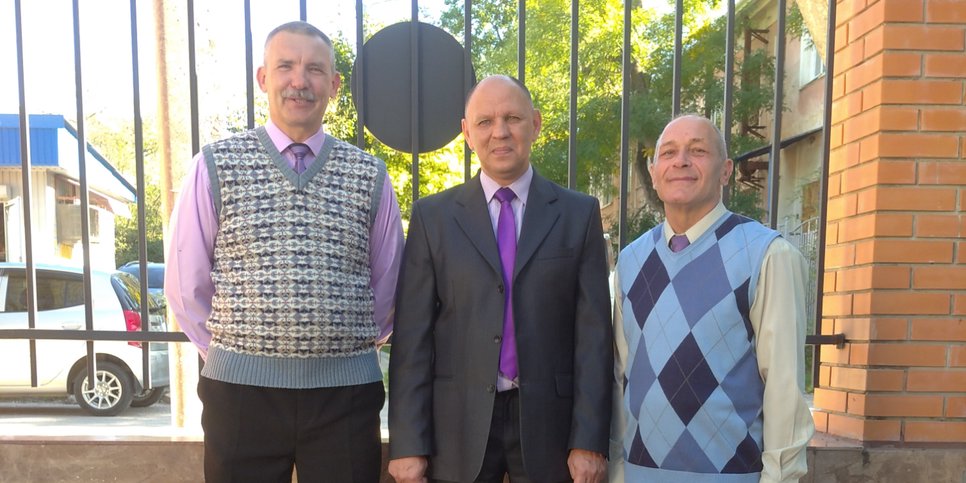Vladimir Sakada, Yevgeny Zhukov and Vladimir Maladyka outside the courthouse before the verdict was announced (October 6, 2022)
Vladimir Sakada, Yevgeny Zhukov and Vladimir Maladyka outside the courthouse before the verdict was announced (October 6, 2022)
A Court in Sevastopol Sentenced Three Jehovah's Witnesses to 6 Years in Prison
CrimeaOn October 6, 2022, judge Olga Berdnikova of the Nakhimovsky District Court of Sevastopol found three Jehovah's Witnesses guilty of extremism. Yevgeniy Zhukov, Vladimir Maladyka and Vladimir Sakada got 6 years in prison each. The believers were taken into custody. They intend to appeal the verdict.
Zhukov, Maladyka and Sakada faced persecution for their faith on October 1, 2020, at the height of the coronavirus pandemic. For the fact that believers participated in peaceful religious meetings, a criminal case was initiated against them. They, as well as their fellow believers from Sevastopol, were searched. On the same day, four believers, including Zhukov, Maladyka and Sakada, were sent to a pre-trial detention center, where they spent 6 to 7.5 months. In addition, Vladimir Maladyka and his wife were subjected to compulsory examination in a psycho-neurological dispensary because of a bag of powdered milk found at their home, which seemed suspicious to the investigators.
Vladimir Sakada and Vladimir Maladyka have families, Evgeniy Zhukov takes care of his disabled brother. All three believers have a reputation as respectable people and law-abiding citizens.
The investigation was conducted by the FSB of Russia for the Republic of Crimea and Sevastopol for about six months. In April 2021, the case went to trial. As “evidence” of the believers’ guilt, the investigation used hidden video recordings of worship services made by FSB agents. In the video, believers pray, sing and discuss the Bible. During the court hearings, Vladimir Sakada stated that the videotapes presented to the experts and the court "were subjected to unauthorized changes." However, the court refused to verify this material evidence. FSB officer Dmitry Shevchenko, who conducted operational-search activities, said in court that there were no signs of extremism and facts of inciting religious hatred in the actions of the defendants. According to him, he has been familiar with the activities of Jehovah's Witnesses in Sevastopol since 2015, and their services have always been of an exclusively religious nature.
However, the court returned a guilty verdict. In addition to imprisonment in a colony, the court imposed travel restrictions on believers after serving their sentence for a period of 1 year. For 7 years, they are prohibited from publishing in the media and the Internet.
In Crimea, a total of 16 Jehovah's Witnesses have faced persecution for their faith, four of them are serving sentences in a penal colony. In June 2022, the European Court of Human Rights declared the persecution of Jehovah's Witnesses in Russia unlawful, and all charges against them unfounded.



